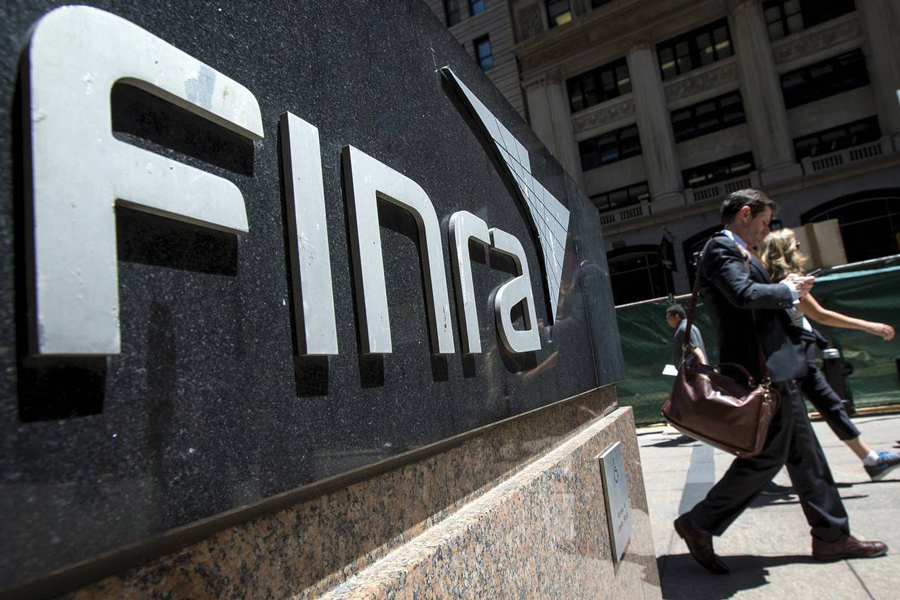

Lax anti-money-laundering oversight is costing Interactive Brokers more than $38 million in fines and other penalties, Finra announced Monday morning.
The Greenwich, Connecticut-based broker-dealer that claims more than $8.2 billion worth of consolidated equity capital was fined by the Financial Industry Regulatory Authority Inc., the Securities and Exchange Commission and the Commodity Futures Trading Commission for widespread anti-money laundering failures for at least five years through September 2018.
According to Finra, which fined the electronic B-D $15 million, Interactive Brokers “did not reasonably surveil hundreds of millions of dollars of its customers’ wire transfers for money laundering concerns. Those wires included million of dollars of third-party deposits into customers’ accounts from countries categorized as high risk by U.S. and international AML agencies.”
The Frina announcement stated that the B-D “did not reasonably investigate suspicious activity when it found it because it lacked sufficient personnel and a reasonably designed case management system.”
Finra’s investigation found that even after a compliance manager at the BD warned a supervisor that “we are chronically understaffed” and “struggling to review reports in a timely manner,” it took Interactive Brokers years to materially increase its staffing or make improvements to systems.
“Today’s action is a reminder that member firms must tailor their AML programs to the firms’ business model and customer base, and also dedicate resources to programs commensurate with their growth and business lines,” said Jessica Hopper, Finra executive vice president and head of enforcement.
“Finra will continue to take steps to ensure that firms comply with their obligation to monitor for, detect and report suspicious activity,” she added.
Interactive Brokers responded to a request for comment for this story with the following statement:
“As announced today, Interactive Brokers LLC has resolved matters with Finra, the U.S. Securities and Exchange Commission and the Commodity Futures Trading Commission relating to [the firm's] past anti-money laundering and Bank Secrecy Act program and practices.
We cooperated fully with our regulators in these inquiries, and the significant steps that we have taken to expand and enhance our program were taken into account in today’s settlements.
Interactive Brokers continuously works to enhance and strengthen our controls, and makes significant investments to improve our BSA and AML programs. We are committed to ensuring that our programs meet all regulatory expectations and our compliance staff have state of the art systems at their disposal.”
Adam Gana, a securities attorney who was not involved in this case, said the size of the fines illustrates how seriously regulators take lapses in security when it comes to money laundering.
“This is massive as you can see by the extent of the fines, because money laundering isn’t just about drug dealers, it’s also about terrorism and all sorts of criminal activity,” he said. “Broker-dealers and banks are the front lines and that’s why they’re required to have anti-money laundering systems in place, and this is a glaring supervisory hole.”
In its 2020 Risk Monitoring and Examination Priorities Letter, Finra highlighted AML as an area of concern and noted it will assess firms’ compliance with Finra Rule 3310. Firms can also review Finra’s Examination Findings Reports to understand Finra’s areas of concern related to AML and Finra provides guidance and offers compliance training to firms about their AML compliance obligations.
In determining the appropriate sanction, Finra considered the meaningful steps that Interactive Brokers took after the commencement of Finra’s investigation to remediate its AML program.

While industry statistics pointing to a succession crisis can cause alarm, advisor-owners should be free to consider a middle path between staying solo and catching the surging wave of M&A.

New joint research by T. Rowe Price, MIT, and Stanford University finds more diverse asset allocations among older participants.

With its asset pipeline bursting past $13 billion, Farther is looking to build more momentum with three new managing directors.

A Department of Labor proposal to scrap a regulatory provision under ERISA could create uncertainty for fiduciaries, the trade association argues.

"We continue to feel confident about our ability to capture 90%," LPL CEO Rich Steinmeier told analysts during the firm's 2nd quarter earnings call.
Orion's Tom Wilson on delivering coordinated, high-touch service in a world where returns alone no longer set you apart.
Barely a decade old, registered index-linked annuities have quickly surged in popularity, thanks to their unique blend of protection and growth potential—an appealing option for investors looking to chart a steadier course through today's choppy market waters, says Myles Lambert, Brighthouse Financial.
